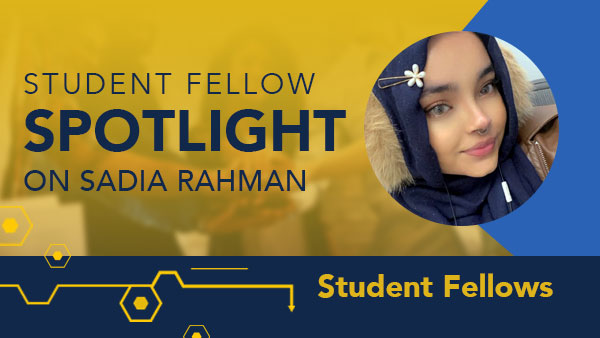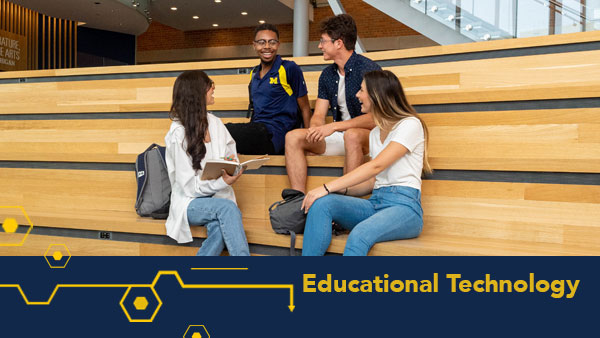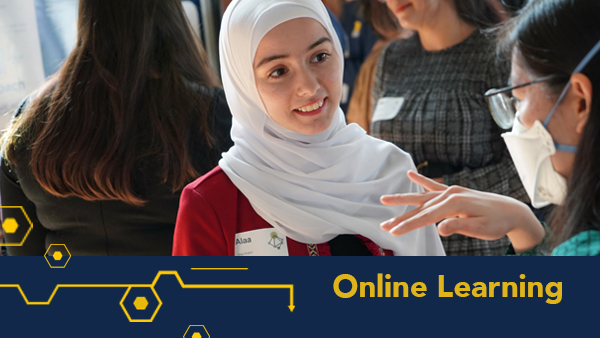By Jacob Aguinaga, Learning Experience Designer
In 2019, the Center for Academic Innovation partnered with the School of Education to offer graduate students at the University of Michigan the opportunity to earn a newly established Learning Experience Design Graduate Certificate. The certificate combines courses on learning theory, curriculum design, and learning design at the School of Education with authentic design opportunities at the Center for Academic Innovation (CAI). Students enrolled in this 12-credit certificate gain the foundational knowledge and experience necessary to design innovative and engaging educational experiences in multiple contexts of teaching and learning. Included in the 12-credit hours of course work is a 180-hour residency at the Center for Academic Innovation.
As a new academic year begins, a third cohort of graduate students has just started the certificate program. In a brief nine months, the students’ newly forged paths will not only add to the legacy of the program but also provide a potential roadmap for prospective learning experience design students. But even as students continue to be drawn to this program, questions remain regarding the opportunities afforded through a certificate in learning experience design and the potential value of such a program. Luckily, with two cohorts of students that have completed the certificate program, there are plenty of examples that shed light on these questions.
A Career in Learning Experience Design at U-M
Perhaps the clearest path graduates could take after earning this certificate is to pursue a career in the field of instructional or learning experience design. Three of the program’s graduates did just that while remaining at the University of Michigan. Pam Saca and myself joined the Center for Academic Innovation as a Learning Experience Designer for Accessibility and a Learning Experience Designer, respectively.
The Learning Experience Design certificate program enabled me to walk into my current position and be able to meaningfully contribute to projects from day one. One of the most valuable parts of the certificate experience was the residency aspect, which provided the opportunity to practice implementing design considerations discussed in class, and in working alongside the LXD team, I was able to refine my approach to and thinking about design work.
Saca echoed some of the same sentiments about the internship experience.
“As students, we were a part of decision-making processes, shared our opinions, and created actual work that eventually exists within CAI’s courses,” Saca said, noting that this makes the coursework feel much more than just “theoretical.”
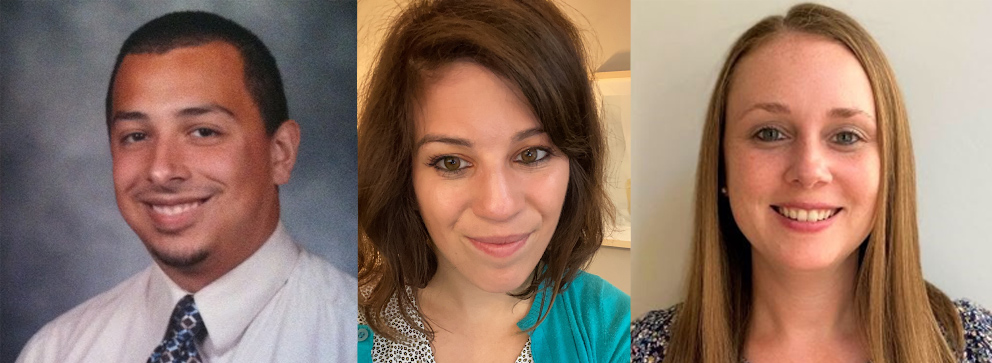
Carolyn Seiger opted to stay at the University of Michigan as well after completing the certificate program, joining the School of Public Health’s National Center for School Safety as an instructional designer. In reflecting on how the certificate program prepared her for her current role, Seiger remarked that the program “taught me to apply relevant theories to create interactive products with alearner-centered focus.”
Other Career Options
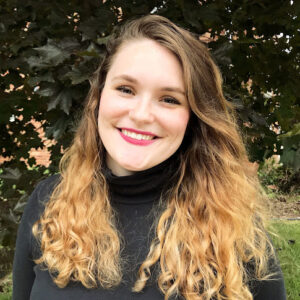
Among the program’s graduates, some found new positions still at the post-secondary level but outside the specific field of instructional design and learning experience design. Julia Maxwell accepted a faculty position at San Francisco State University as a First-Year Experience Librarian where she continues to draw on her experience in the learning experience design certificate program.
When asked how the program helped prepare her for her current position as a First-Year Experience Librarian, Maxwell shared that the program “helped me be a better advocate for learners and become more confident with using technology to assist in designing learning experiences.”
One of the tasks that Maxwell has been able to lend her learning experience design insights to is the development of an asynchronous course for information peer-mentors who work at her library.
Nicholas Garza began searching for jobs as a chemistry instructor following his completion of the certificate program and is now a chemistry instructor at North Central Michigan College. When reflecting on the value of the certificate program, Garza was quick to note how instrumental the program was in helping him land his current position.
“The certificate program directly helped me get my new job. The community college I am working at is trying to expand their online course options, so I was able to talk about my experiences in the certificate program when interviewing,” he said.
The unique combination of instruction and experience gained in the Learning Experience Design Certificate program, as evidenced in these examples, prepares professionals for new contexts and enables them to better meet the needs of their role.
A Continuing Education
Some of the program’s graduates are now pursuing Ph.D. degrees in various fields while drawing on what they learned about learning experience design to inform their current studies. Burnett Vave commented on how the program helped him to approach projects with a more adaptable mindset, allowing him to shift his focus as areas of need reveal themselves. Juan Pinto, now a Ph.D. student at the University of Illinois at Urbana-Champaign studying digital environments for learning, teaching, and agency, credits the certificate program, in part, for helping him to identify the next step in his academic career.
The program “helped me identify the research I wanted to pursue and the more specific topics I am interested in”, Pinto stated. “It has also helped me feel much better prepared for more advanced work in educational technology and its design”, he continued, “especially (again) when it comes to research in the field.”
These sentiments echo the value that a certificate in learning experience design can have outside of the professional practice. Insights gained into how to develop learner-centered experiences continue to manifest as one pursues advanced degrees while exploring their interests.
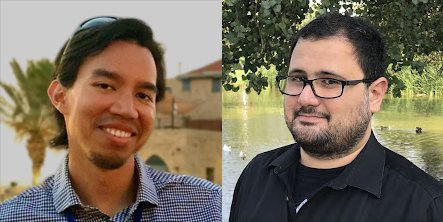
While a number of past cohorts of students have left the University and have gone on to pursue new endeavors, some students remain on campus as they work to complete their degrees. Even in this space, students still note how the certificate program has shaped their studies, their work, and the opportunities they hope to pursue.
Peng Heng will soon complete his master’s degree in educational studies. As he reflected on his time in the certificate program and his own experience learning remotely through the COVID-19 pandemic, Heng noted that these experiences “greatly helped me realize the importance, necessity, and benefits of online learning and curriculum design, in the context of the continuing global pandemic.” He said he hopes to take the knowledge gained from his time in the program and pursue a Ph.D. upon his graduation.
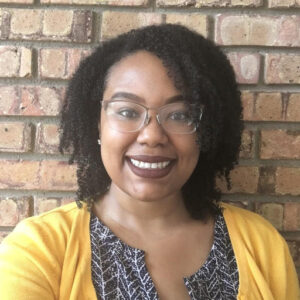
Amber Goodwin is currently working as a learning experience design fellow at the Center for Academic Innovation. While she has continued to contribute to the work that the Center is doing, she has also been approached to do learning experience design work outside of the Center.
Goodwin shared that she “was recruited via LinkedIn for some of the independent contract work I’m doing. They saw my portfolio (my final assignment in the program) and reached out. I do believe that course design can be learned without participating in formalized education, but having the pedagogical background and frameworks is an asset that made me stand out.” Even prior to graduation, the learning experience design certificate program is giving students the skills to be competitive and to contribute in the labor market.
While the Learning Experience Design Graduate Certificate Program may have only a relatively small number of students who have completed it, their stories and career trajectories point to the value that the program offers and the variety of ways the experience can be beneficial. One thing is certain: a certificate in learning experience design is applicable to fields beyond just instructional and learning experience design. It provides students with the skills and the experience to navigate the evolving educational landscape while ensuring high-quality experiences for learners of all types.
